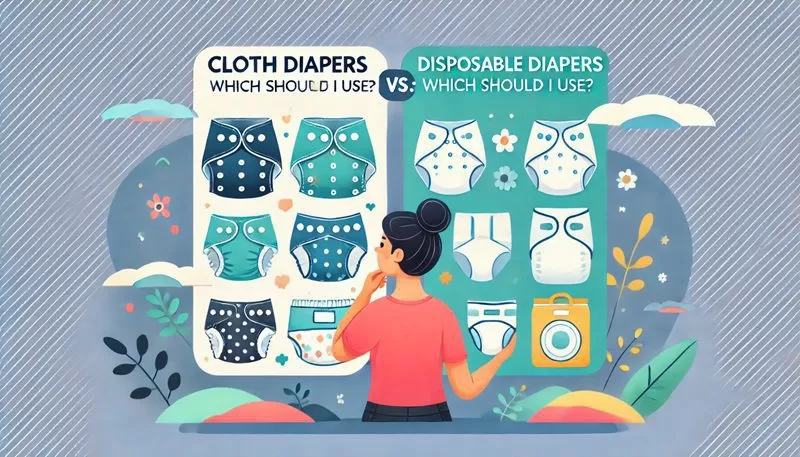Table of Contents
Cloth vs Disposable Diapers
As a new parent, one of the earliest and most important decisions you’ll make for your baby is choosing between cloth diapers and disposable diapers. Both options have their advantages and disadvantages, and what works best depends on your family’s lifestyle, values, and budget. In this article, we’ll explore the pros and cons of each, offering insights to help you make an informed choice. Whether you’re looking for convenience, cost savings, or sustainability, this guide will help you navigate the diaper decisions ahead.
When deciding between cloth and disposable diapers, it’s important to consider the long-term environmental impact and the convenience of each option. For instance, according to the Environmental Protection Agency (EPA), disposable diapers contribute significantly to landfill waste, while cloth diapers can be reused, reducing overall waste. By understanding the environmental impact of disposable diapers, parents can make a more informed choice that balances convenience and sustainability.
Cloth Diapers: Pros and Cons
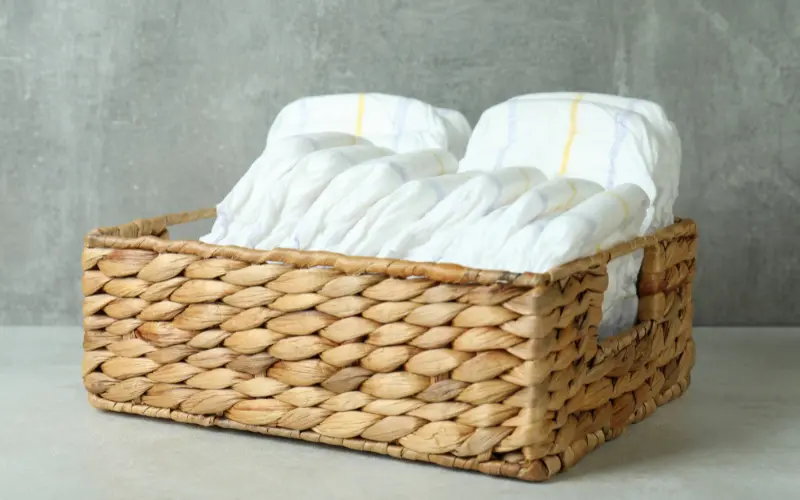
Cloth diapers have made a big comeback in recent years due to their environmental benefits and cost-effectiveness. Modern cloth diapers are far from the traditional ones you may remember. With new fabrics, designs, and ease of use, they’ve become a viable option for many parents.
Pros of Cloth Diapers:
- Eco-Friendly: Cloth diapers can be reused multiple times, which significantly reduces the number of diapers sent to landfills.
- Cost-Effective: While the upfront investment in cloth diapers may seem high, you’ll save money in the long run by reusing them. Check out our Reusable Cloth Diapers, which offer great durability and absorbency.
- Gentle on Baby’s Skin: Cloth diapers are typically made from natural fibers, making them less likely to cause skin irritations or diaper rash.
- Customizable Fit: Cloth diapers come with adjustable snaps or Velcro closures that provide a customizable fit for your growing baby.
Cons of Cloth Diapers:
- Laundry: Cloth diapers require frequent washing, which can be time-consuming and adds to your laundry load.
- Upfront Cost: The initial cost of purchasing enough cloth diapers for regular use can be expensive, although you save in the long term.
- Less Convenient for Travel: While you can pack cloth diapers for trips, they’re not as convenient as disposables, especially if you don’t have access to a washing machine.
For parents interested in an eco-friendly and cost-effective option, cloth diapers like our Washable Cloth Diaper Set are a fantastic choice.
As you consider your diapering options, it’s also essential to think about how diaper choices may influence your baby’s overall comfort in different seasons. For a comprehensive understanding of how to dress your little one throughout the year, check out our Ultimate Guide on Dressing Your Baby for Every Season This guide offers valuable tips on selecting the right clothing materials and layers to keep your baby comfortable, no matter the weather.
Disposable Diapers: Pros and Cons
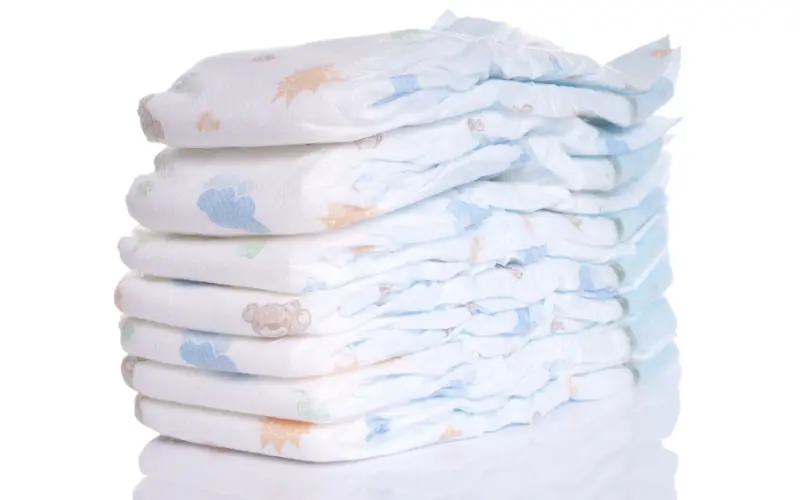
Disposable diapers are a convenient and popular choice for many families. They’re easy to use and widely available, making them the go-to option for busy parents. However, they do have their drawbacks, especially when it comes to environmental impact.
Pros of Disposable Diapers:
- Convenience: Disposable diapers are ready to use right out of the package and are easy to dispose of when soiled. They’re especially handy for outings or overnight use.
- High Absorbency: Most disposable diapers have excellent absorbency, keeping your baby dry for longer periods. Consider trying our Super Absorbent Disposable Diapers for reliable leak protection.
- No Laundry: Since they’re single-use, you won’t need to worry about washing them—perfect for parents with busy schedules.
- Availability: You can find disposable diapers at nearly every store, and there’s a wide range of brands and sizes available.
Cons of Disposable Diapers:
- Environmental Impact: Disposable diapers contribute to landfill waste, taking hundreds of years to decompose.
- Ongoing Costs: While the upfront cost is lower, you’ll continually need to buy new diapers, which adds up over time.
- Potential Skin Irritation: Some babies have sensitive skin and may experience diaper rash from the chemicals in disposable diapers.
If convenience is a top priority for you, our Premium Disposable Diapers offer excellent performance and comfort, making them an ideal choice for busy families.
Adjusting to parenthood often comes with various challenges, and one of the most common is sleep deprivation. If you’re feeling overwhelmed by the demands of caring for your little one, you’re not alone. Understanding how to manage sleep deprivation is crucial for both your well-being and your ability to care for your baby effectively. For valuable tips on navigating sleepless nights and ensuring you get the rest you need, check out our article on How to Deal With Sleep Deprivation After Baby
Cloth Diapers Pros and Cons: Disposable vs Cloth Nappies
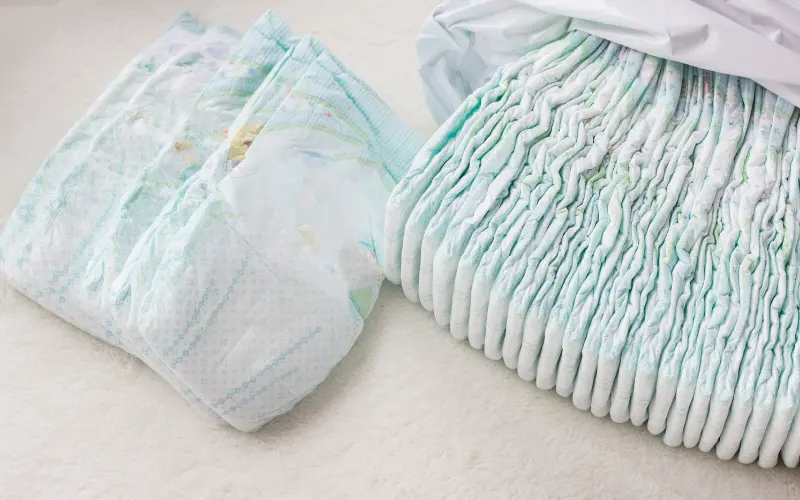
When comparing cloth diapers pros and cons, it’s clear that both options have their merits. While cloth diapers are better for the environment and more cost-effective in the long run, disposable diapers offer unparalleled convenience and ease of use. The decision ultimately comes down to your personal preferences and lifestyle.
For example, parents who are environmentally conscious and don’t mind the extra laundry will likely appreciate the sustainability and savings of cloth diapers. On the other hand, if you’re a parent who values convenience and needs a quick, hassle-free solution, then disposable diapers might be the better option.
Whether you choose cloth or disposable, it’s important to consider your baby’s needs and your family’s lifestyle. You may even find a hybrid approach works best—using cloth diapers at home and disposables for outings or overnight.
Diaper Decisions: Cloth Diapers vs. Disposable
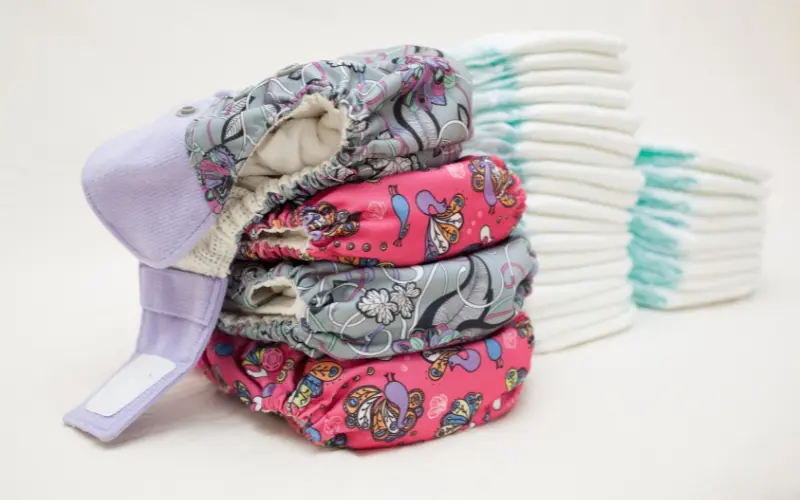
Making the right diaper decisions doesn’t have to be overwhelming. Here are some factors to consider when deciding between cloth diapers vs. disposable:
- Budget: How much are you willing to spend upfront, and do you prefer to invest in reusable products or buy disposables regularly?
- Convenience: Are you okay with washing cloth diapers regularly, or do you need the convenience of disposable diapers, especially for trips and daycare?
- Environmental Impact: Is reducing your carbon footprint a priority for you? Cloth diapers are reusable, while disposables contribute to landfill waste.
Ultimately, the decision between cloth diapers vs. disposable comes down to your family’s unique needs. Our Dual-Option Diaper Pack offers both cloth and disposable options, giving you the flexibility to choose based on your circumstances.
When considering diaper options, it’s also essential to think about your baby’s overall care routine, including safe bathing practices. Proper bathing techniques can help ensure your little one remains clean and comfortable, complementing whichever diaper choice you make. For valuable insights on how to safely bathe your newborn or toddler, check out our guide on Safe Bathing Practices for Newborns and Toddlers
Disposable vs. Cloth Diapers: Pros and Cons Recap

To summarize the debate of disposable vs. cloth diapers: pros and cons, both options offer distinct benefits:
- Cloth diapers are reusable, environmentally friendly, and cost-effective in the long run but require extra effort in washing and upkeep.
- Disposable diapers are convenient, highly absorbent, and easy to dispose of, making them ideal for on-the-go parents, though they contribute to more waste and can be costly over time.
If you’re still unsure which to choose, consider trying a combination of both. You can use cloth diapers at home and disposable diapers when you’re out or overnight. For flexible diapering solutions, explore our Dual-Option Diaper Pack, designed to give you the best of both worlds.
Managing diaper blowouts and leaks can be one of the more challenging aspects of diapering, but with the right strategies, you can minimize the mess. Cloth diapers, with their adjustable fit and absorbent materials, often provide better coverage around the legs and waist, reducing the chances of leaks. However, modern disposable diapers are designed with advanced leak-guard technology, making them highly effective for overnight use and long outings. To prevent blowouts, always ensure the diaper fits snugly around your baby’s legs and waist, and consider using products like Managing Diaper Blowouts and Leaks for added protection. Properly adjusting the diaper size and checking frequently can also help manage leaks and keep your baby comfortable.
Conclusion
Whether you choose cloth diapers or disposable diapers, what matters most is finding a system that works best for you and your baby. Both options have their pros and cons, but with the right products and information, you can make a decision that suits your family’s needs. Remember, it’s okay to try both and adjust based on what works best for your baby and lifestyle.
At [Your Store], we offer a range of diapering products to support whichever choice you make. From eco-friendly cloth diapers to highly absorbent disposables, we’ve got you covered with everything you need to keep your baby comfortable and happy.
When deciding between cloth and disposable diapers, it’s essential to consider not only the convenience and environmental impact but also your baby’s health. For instance, some newborns may experience health conditions like jaundice, which requires extra care in monitoring their overall comfort and skin condition. If you’re concerned about jaundice and want to learn more about its symptoms, causes, and treatment, read our comprehensive guide on Jaundice in Newborns – Symptoms, Causes, and Treatment for valuable insights.

